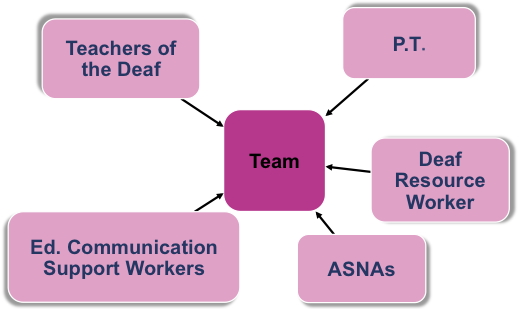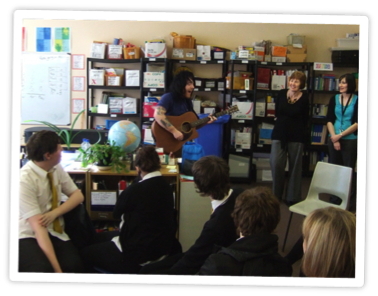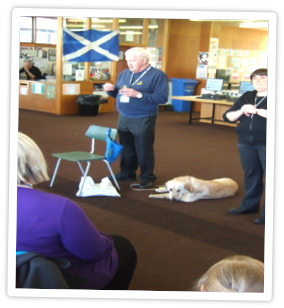Secondary Focus Day in Deaf Education
Presented on Monday 22nd October, 2012
Facilitating Inclusion in a Mainstream Secondary
H.Ashley McKenzie, Multi-Sensory Service, Dundee
Multi-skilled Team

Notes: We are a multi-skilled team based in a mainstream secondary school of approximately 900 pupils in Dundee. All staff are fluent sign language users with at least BSL level 2. One of our Communication Support Workers is a registered SASLI interpreter and the other worker has just completed BSL 3/4. We also have 3 qualified and extremely experienced Teachers of the Deaf as well as a teacher undertaking training. Our Deaf Resource Worker has been with the Service for over 10 years and has experience in nursery, primary and secondary. Our HI ASNA, Additional Support Needs Assistant, is an experienced signer who supports pupils at college too. Finally, I am a qualified ToD with 16 years' experience across all sections of the service. At present we have 11 profoundly deaf pupils attached to the EP as well as a few peri pupils within the school. The pupils' communication ranges from full BSL to oral cochlear implant users.
Facilitating Inclusion
- Flexible approach to supporting students
- Effective communication
- Awareness raising
- Deaf studies and PSD programme
- Enhanced transition
- Sign language training
Notes: Successful inclusion can be difficult to achieve. We have found that the items listed here are crucial elements which combine to breakdown the barriers commonly experienced by deaf pupils. I will now take you through each of these elements.
Supporting Students
- ECSWs interpreting in mainstream classes
- ToDs teaching in base and providing tutorial back-up
- Staff working collaboratively to share information re pupil needs
- Use of electronic notetaking
- Individualised assessment arrangements
Notes: All our pupils access mainstream classes according to their ability. We provide in-class support for these pupils. ECSW and ASNAs go into classes, interpreting spoken information and liase with mainstream teachers re programmes of work and assessments. They also provide deaf awareness guidance for mainstream teachers. TODs teach English within the base as well as tutorial periods. Teachers and support staff work collaboratively to provide the necessary back up support. I have used electronic notetaking with senior pupils who have good literacy skills. This was developed from a pilot study that I conducted a few years ago. It has been very useful for the pupils to have experience of this service which is often available for further education. Assessment arrangements are totally flexible and are matched to suit individuals. We introduce special arrangements from S1 so that the pupil is comfortable by the time prelims come around. We have been involved in signing, recording and transcribing assessments for many years and staff are rotated so that they are comfortable in delivering exams in many subjects.
Effective Communication
- Collaborative working between sensory staff and mainstream staff
- PT meetings
- Link Officer
- Contact logs
Notes: Effective communication between staff is imperative. We recognise the importance of good relationships with mainstream teachers, subject PT's and SMT. Staff work tirelessly to ensure that mainstream teachers are kept up to date, including back ground information about the pupils where necessary. ASP targets are shared with mainstream teachers and feedback on pupil progress is regularly received. I contribute to school PT meetings and cascade back information to the department. I also deliver presentations to PT's about issues such as subtitling, assessments etc. The school link officer also ttends our dept meetings. This is very helpful as it gives us a knowledgeable representative on the SMT. All staff record communications in contact logs. These allow us to reflect on our practice and share information effectively.
Effective Communication
- Target meetings at beginning of session
- Annual review meetings
- Parents' night
- Course choices
- Parental questionnaire
Notes: Communication with parents and carers is also very important. At the beginning of each new session I invite parents into school to discuss and agree ASP targets for their child. We have found that parents respond positively to this. The Annual Review meetings are held at two different times of the year. The senior reviews, S3 and above, are held in November. This allows us additional time to prepare for any transitions or part-time college placements. The junior reviews, S1 and 2, are held in February. Parents nights are supported by our ECSWs. Deaf parents are able to meet with mainstream teachers and raise any concerns they may have through an interpreter. Parents are welcome to come in and discuss their child's progress with EP staff at any time. We often find that parents don’t ask to have an appointment time with us on parents' night because they are regularly kept up to date by phone calls and letters home. During S2 pupils are asked to choose courses for third and fourth year. We send information home to parents and then arrange a meeting to discuss choices. This works well because both parents and pupils often have questions that they want to ask. After Easter we send out a questionnaire to parents to gather feedback on how we are doing. This is useful because there is always room for improvement.
Awareness Raising
- SE talks to S1
- Training arranged for all school staff
- Sensory Awareness Week
Notes: Every year we deliver awareness raising lessons to the new S1 pupils. Many of the pupils will not have met deaf people before and this is a great opportunity for them to look at equipment, ask questions and learn to sign a little. Senior pupils are generally involved in these talks. This helps to reduce awkwardness and encourages communication. It is also a positive role for the deaf pupil. Staff at Craigie are regularly changing and so we have a rolling program of awareness raising. Last session MSS delivered training throughout the school at SMT, teacher and support level. However, this is like painting the Forth Bridge and after Christmas I will be looking to arrange the next sessions. In order to support Supply teachers we have created a simple guide sheet with communication tips which are given to all supply teachers at Craigie. Similarly, student teachers come and spend an afternoon with us to learn how our department operates. Last session we held our very first awareness Raising week at Craigie. For a week there were events taking place in registration, lunchtime and a special assembly was held. We had visits by ex-pupils, Guide Dogs and Hearing Dogs. There were competitions and information films ran in public areas. It was a great success and we are already planning the next one.
Visit by Role Models

This is a photo of one of our former VI pupils who has gone onto record his own music. Our pupils were very impressed and keen to hear what he had done since leaving school.
Deaf Studies and PSD
- Specially created PSD programme to address the needs of HI pupils
- Outings arranged with HI pupils from other areas
- Listening Bus
- Orkney trip
- Presentations
Notes: The pupils we support have a variety of social and emotional difficulties. To address this issue we have developed a Personal and Social Development programme specifically for deaf pupils. This encompasses subjects such as friendships, peer pressure, sexual health, advocacy, drugs and bullying. There has been input from the pupils themselves which has then been built upon by staff.
Pupils also have opportunities to mix with other deaf peers through our Family Network Group. Trips have been arranged to Monikie Park, Xscape Centre Braehead and Megabowl. Pupils from Angus, Perth and Fife are invited to join these outings which are very popular with the pupils. New technology is an important part of our Deaf Studies programme and so a visit to the Listening Bus is a regular occurrence. Last year a small group of deaf pupils went on a 3-day visit to Via House in Orkney. This was arranged and partly funded by the MSS. It was a great opportunity for our P7 and S1 pupils to experience sensory workshops and share time together in a beautiful and tranquil environment.
Visit by Guide dogs and Hearing Dogs for the Deaf

During our Sensory Awareness week we were fortunate to have both Hearing Dogs for the Deaf and Guide Dogs in school. As you can imagine, Bob here, just 10 months old, was a big hit with the staff as well as the pupils. This was an excellent opportunity for pupils to ask questions about owning and caring for a guide dog as well as hearing anecdotes about puppy training.
Enhanced Transition
- Transition begins in P6 and is developed during P7
- Pupils attend secondary for DEAF STUDIES
- Primary 7 nights
- Transition lessons are held weekly between January and June
- Principal Teacher attends annual review meetings
Notes: This is part of the Enhanced Transition Programme for pupils moving to Secondary school. Successful transition requires planning and organisation so that both parents and child feel secure. We also have an extensive programme to support pupils who are ready to leave school for college, work or training programmes. At the moment we have three pupils who are involved in part-time courses at Dundee college and are supported by our team. This requires a lot of liaison between college and school. However, the look on the face of a young deaf adult on their first day at college makes it worth it.
Sign Language Training
- Learn to sign class for school staff
- Signing club for pupils
- Learn to Sign option for other schools
- Regular refresher training for EP staff
Notes: All our pupils use sign language to some degree. Therefore an important part of our work is increasing the level of signing within the school. Support staff are invaluable in this area. We have set up a sign class, introduction to sign, for staff at Craigie. This is a lunchtime session supported by Deaf Resource Worker and both ECSWs. There is also a level 2 type course running for staff who have passed level 1 and are struggling to find a class in the Dundee area. The pupil signing club is very popular and it also runs during a lunchtime. Recently we had a request from a local mainstream secondary school who wanted to run BSL as an optional module for pupils. Our Deaf Resource Worker now delivers this class as well. Our aim is to build an inclusive learning environment with no barriers for deaf children. Through effective communication, shared team values and optimal use of individual strengths we hope to achieve this.
